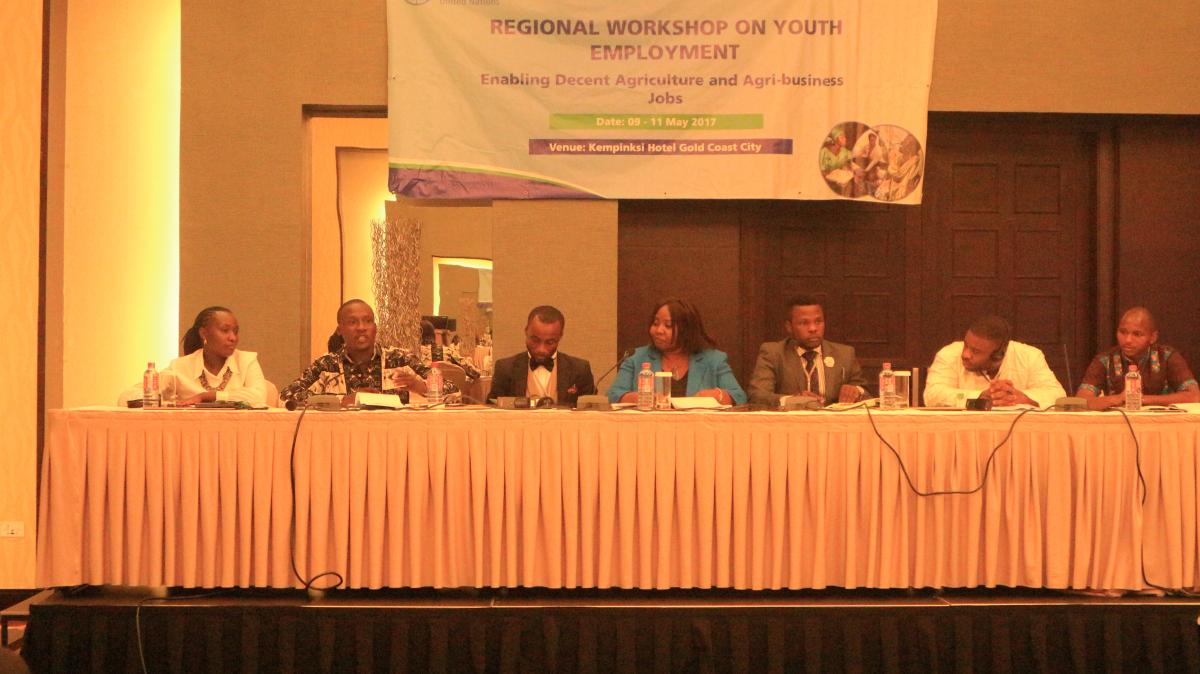Youth employment: Enabling decent agriculture and agribusiness jobs
Africa has the youngest population in the world with over 92% of the youth represented among the extremely poor (ILO, 2015a). The youth population is expected to grow at an exponentially high rate, thus bringing forth the need to create between ten to twelve million new jobs in Africa per year until 2035 to absorb the new labour market entrants (UN, 2015). The way to create employment for the youth is through agriculture. It is against this background that the Food and Agricultural Organization of the United Nations (FAO) organized a two-day workshop on the 10th and 11th May, 2017 focused on the theme: Youth Employment: enabling decent agriculture and agri-business jobs to unveil a special programme in this direction.
The workshop brought together representatives of development partners such as the Food and Agriculture Organization (FAO), The World Bank, New Partnership for Africa's Development (NEPAD), Institutional Institute of Tropical Agriculture (IITA), Technical Centre for Agricultural and Rural Cooperation (CTA), African Agribusiness Incubator Network (AAIN) and Forum for Agricultural Research in Africa (FARA). Also present were some active players in the private sector like: Africa Business Group and Songhai. The youth was represented by some youth networks: Young Professionals for Agricultural Development (YPARD) Concerned Africans Youth Forum (CAYF), a few young farmers’ associations, young agripreneurs, and government representatives were also present.
The discussion kicked off with the identification of opportunities in agriculture in the rural areas of Africa. These prospects exist in the areas of livestock production, crop production, agro processing, agritech, forestry, services provision and conversion of agriculture waste into useful products. It was identified that these opportunities are not being harnessed by the youth because of lack of adequate knowledge, skills, finance, infrastructure, inadequate access to technology and innovation. Different segments of youths were identified thus; rural and urban youths, educated and uneducated youths, and disabled youths, which requires different approach and strategies to address the problem of unemployment. It was also identified that there is the need to trust the youth with the necessary resources to harness the potentials of agriculture in Africa.
Deliberating on how to make the practice of agriculture more attractive to young people, a discussion was held on youth leadership in agriculture and agribusiness. This was to address the low involvement of youth in the sector resulting from the negative perception of agriculture by Sub-Saharan youth. In this session, youth professionals shared their success stories and spoke of their expectations of the government, the private sector and other stakeholders of agriculture and agribusiness.
Michael Opeyemi Ige- the Executive Director of Concerned Africans Youth Forum (CAYF), Grace Wanene and David Asiamah, the respective founders of Youth Agro-Environmental Initiative and Agro Mindset comprised the panel of youth that held the discussion. Also on the panel were Oludare Odusanya of IITA-Youth Agripreneurs, Georges Akinbode of AgriPro Focus’ Youth in Agribusiness and Kafui Kwesi Agbe, YPARD Ghana Representative.
The panel revealed that education, information, mentoring and networking are key elements that will change the negative perception of youth towards agriculture. The success stories of young professionals’ enterprises in agriculture such as Trotro Tractor Limited which design a system to connect mechanization services to smallholders through the use of mobile phones were cited as a good example of a working and scalable youth enterprise. It was identified that such scalable enterprises and innovation by young people should be invested into to employ more youth in agriculture. The discussion shows that youth have great ideas and that what is needed is the necessary investment to secure the future.
On the issue of policy framework for youth employment in agriculture it was identified that policies for the youth should not be formulated without the total involvement of the youth. Policies must be developed on access to land, registration and certification of products, market access and importation of cheap products into African countries. The youth present were charged to review existing youth policies and strategies in their various countries.
The FAO Special Programme on Youth employment: enabling decent agriculture and agri-business jobs has three components: Mapping, knowledge generation and sharing for evidence-based policy and programme development; Capacity development and institutional strengthening to build systemic capacities for youth employment in agriculture and agribusiness; Support to the upscaling of successful approaches through programme formulation and the facilitation of multi-stakeholder partnerships. The programme identified the need for more collaborative effort, learning and scaling up of best approaches to tackle youth employment. It also identified the engagement of more youth in programme formulation and implementation. The programme will initially target a group of ten countries covering the different SSA sub-regions between the year 2017 and 2021 and then be expanded to benefit about twenty-five countries. This will depend on resource mobilization in the medium term. Ten target countries will be selected based on country interest among the following: Burkina Faso, Ethiopia, Ghana, Kenya, Mozambique, Mali, Malawi, Nigeria, Senegal, South Sudan, Tanzania, Rwanda, Uganda, Zambia, and Zimbabwe.
Related Posts
Comments
By accepting you will be accessing a service provided by a third-party external to https://archive.ypard.net/


